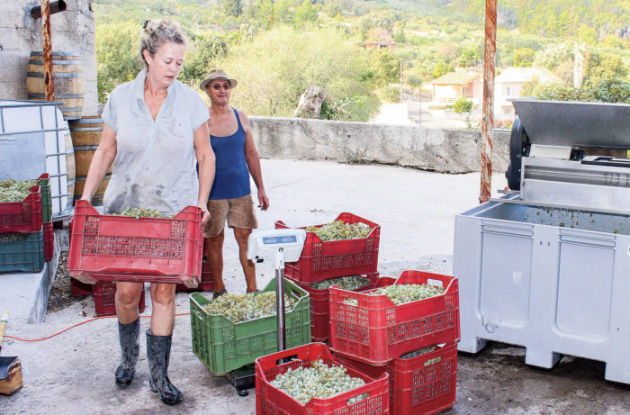
Trading places: Swapping the UK trade for winemaking
“I think it’s inevitable if you’re in the wine trade that you think you can make wine better than anybody else,” says solicitor turned wine importer turned winemaker Robin Baum. “So I thought I’d give it a go.”
Baum is one of a growing number of wine trade professionals who have crossed over to ‘the other side’ and swapped traditional trade roles such sales, buying or importing, for wine production.
He established the Winemakers Club in the early 2000s, a small import business focussed on Italian wines, and gradually built a list of classic but small-scale wines from across Italy. His son joined the business and is now at the helm, leaving Baum to follow his dream of making wine.
“My youngest son now runs the Winemakers Club which today still imports wine from Italy and other countries and also has a wine bar in Farringdon, which is a well-known meeting place for young wine trade people,” he explains. “Gradually as he took over my role decreased and I gave up the day-to-day management to do something that I’ve always wanted, make my own wine.”
His first steps in production were alongside friend and well-known winemaker Sean O’Callaghan to make wine in the Chianti Classico region. He now works with five different wineries across Italy making small-batch wines in ceramic egg-shaped vessels using fruit from each winery.
“I’m hooked and fascinated by trying to make wine in a manner that improves the natural flavour of the grape,” he says. “I’m fed up with the over-oaked, high alcohol scenario and I think everyone else is now too!”
Baum’s wines – under the RBW umbrella – will get their first airing in the UK in September at the SITT tastings. “We will be showing a Chianti Classico and Veneto Bianco and two wines from Sicily, a white and a rosé. We will also show the first wine that I made called Plonk, which I made with a good friend in Chianti which is 100% Merlot,” he says.
The wines will be sold through the Winemakers Club (but not exclusively), which is a handy route to market to have, something that’s helped by having worked in the UK trade and something that other importers are trying too.
Ian Steel from Suffolk-based Italian specialists For The Love of Wine is another importer turned winemaker. He set-up the business in 1995, handing it over to his children Robert and Nicola in 2013, but continued to have a hand in the business until 2017 when he officially retired.
Retirement didn’t last long. “He fully retired on 31st March 2017 and bought the vineyard on 4 April 2017 – so as we say he managed to have four days of retirement!,” says his daughter Nicola Bradbeer.
Steel purchased a vineyard in Puglia and grows Negroamaro, Syrah, Primitivo and Susumanello, making wine at the local co-op Cantina Sociale Sampietrana.
“Since getting involved in the wine trade Ian has always wanted to buy a vineyard,” says Nicola. “The wines are made in an Italian way for the international market; in fact their first sale was to Japan. They currently sell their first vintage to Japan, Germany, Czech Republic, Ireland, Canada and of course the UK.”
In these two cases the winemaking switch has come at the end of successful years in the trade, for Jo Ahearne MW however, things happened the other way around.
She worked at Oddbins in the UK before studying winemaking in Australia and went on to make wine at iconic Australian wineries including Charles Melton and Pipers Brook. From here she returned to the UK and took on more traditional trade roles in the trade at M&S and Harrods, where she was head wine buyer, before getting back into wine production on the Dalmatian island of Hvar in Croatia.
With experience in buying roles in the UK and a first-hand knowledge of what UK consumers enjoy, Ahearne knows stylistically where her wines should be but is quick to point out that there’s no secret formula to making wines for a specific market.
“A lot of people ask me ‘so what does the UK wine trade want’,” she says. “But there’s no such thing as ‘the UK wine trade’ as people are individual so different people looking for different things. That’s probably what I learnt most at Oddbins when I was working on the customer-facing side of things.”
For Ahearne employing the right agent/importer in the right country is paramount to being successful and she often sees producers choosing the wrong agent or the first one that comes along.
“Making wine is quite easy if you know what you’re doing, getting it to market is the hardest bit; you have to get the right people to get your message across and key to this is finding the right agent,” she says.
Ahearne sells her wine in the UK and Ireland through Liberty and is thankful to have a number of salespeople there who really get her wines and story and can use that when they are out selling. She’s a firm believer in the power of third power endorsements and if you cannot be there yourself to sell your wine then you must ensure that your agent can get in the ears of the right people.
As well as making wine in Croatia Ahearne consults on production in a number of European countries, helping wineries to get their wines in shape for the export markets. “A lot it is about getting people understand that while there may be nothing wrong with their style locally, internationally people are looking for different things; less extraction, less oak etc,” she says.
It’s insight like this, as well as experience of working the wine trade in the first place and the connections and contacts which this brings, that has helped those who’ve made the shift from poacher to gamekeeper.




